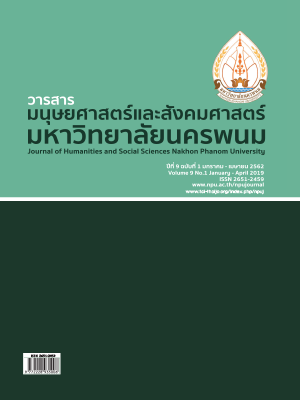Effects of Talent Management System and Succession Planning on Employee Loyalty and Organizational Performance: The Empirical Evidence of TMB Bank
Main Article Content
Abstract
The efficiency persons of the firm are the most important resources for driving the firms to the superior and sustainability growth. The objectives of this research are to study the effect of talent management and succession planning on organizational loyalty and firm performance of Thailand Military
Bank (TMB). The samples of this research are the branch manager of TMB amount 451 branches over all Thailand. The data were collected by five points Likert’s scale questionnaire via mail survey. The discriminations are 0.606 to 0.962 and the reliabilities are 0.897 to 0.941. The data were analyzed by frequency, percentage, mean, standard deviations, Pearson’s correlation, and multiple regression.
The results revealed that talent management and succession planning have positive effect on organizational loyalty as statistical level of .01. Organizational loyalty has positive effect on TMB performance as statistical level of .01. Then, the executive support is the moderator of relationship between succession planning and organizational loyalty as statistical level of .05. Therefore, talent management and succession planning led to organization loyalty and increase TMB performance in the final. Then, the result of this study can utilize in management and development of the firms for future succession.
Keyword: Talent Management; Succession Planning; Organizational Royalty; Firm Performance;
Administrator’s Support
Article Details
References
Chadee, D. & Raman, R. (2012). External knowledge and performance of offshore IT service providers in
India: the mediating role of talent management. Asia Pacific Journal of Human Resources, 50, 459–482.
Jen, C-K., Chou, L-F., Lin, C-Y. & Tsai, M-C. (2012). The influence of the perception of a familial climate on job performance: Mediation of loyalty to supervisors and moderation of filial behavior. International Journal of Psychology, 47(3), 169-178.
Jyoti, J. & Rani, R. (2014). Exploring talent management practices: antecedents and consequences. International Journal of Management Concepts and Philosophy, 8(4), 220-248.
Sharma, P., Chrisman, J. J. & Chua, J. H. (2003). Succession planning as planned behavior: Some empirical
results. Family Business Review, 16(1), 1-15.
Schepker, D. J., Nyberg, A. J., Ulrich, M. D. & Wright, P. M. (2018). Planning for Future Leadership: Procedural
Rationality, Formalized Succession Processes, and CEO Influence in CEO Succession Planning. Academy of Management Journal, 61(2), 523-552.
กรุงเทพธุรกิจ. (2560). แบงก์พาณิชย์ มองต่างมุม ‘ปิดสาขา-ลดพนักงาน.’ รับมือยุคดิจิทัล. สืบค้นเมื่อ พฤศจิกายน 2560,
จาก https://www.bangkokbiznews.com/news/detail/790516.
ธนาคารกสิกรไทย. (2558). ทางออก 4 ปัญหายอดฮิตเรื่องการบริหารคน. สืบค้นเมื่อ เมษายน 2561, จาก
https://www.kasikornbank.com/th/business/sme/KSMEKnowledge/article/HRMTips/Pages/Top4HRMProblems.aspx.
ปัทมา อินทรจันทร์, เกษราภรณ์ สุตตาพงค์ และยุวดี ลีเบ็น. (2560). กลยุทธ์การสร้างและพัฒนาผู้นำองค์กรรุ่นถัดไป. วารสาร
การจัดการสมัยใหม่. 15(1), เดือนมกราคม – มิถุนายน, 45-54.


